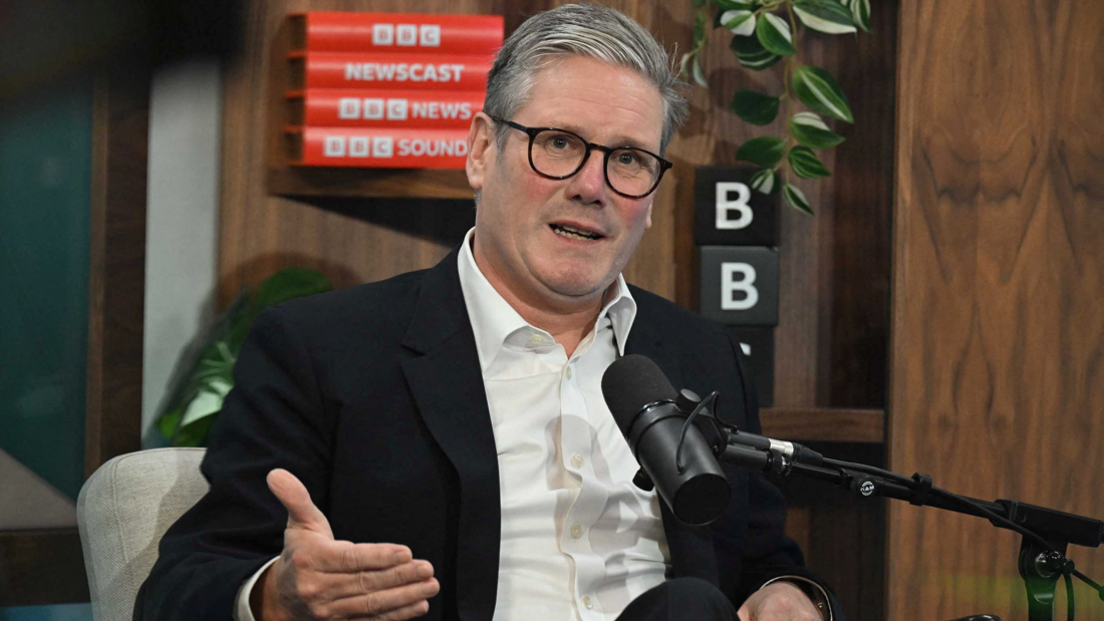Starmer pledges to scrap red tape to boost UK investment

The prime minister will promise to scrap regulation that “needlessly holds back investment” in the UK when he hosts a major summit in London.
Sir Keir Starmer will tell business leaders he wants to “rip out” bureaucracy, and will ask the UK’s competition watchdog to prioritise growth.
Ahead of the international investment summit, some of the world’s biggest companies wrote to the Times saying greater stability had increased the UK’s attractiveness.
However, the government is facing a balancing act ahead of the Budget in two weeks’ time having already signalled that some taxes will rise.
On Sunday, Business Secretary Jonathan Reynolds did not rule out an increase in the rate of National Insurance paid by employers.
Labour pledged in its manifesto not to raise National Insurance. But Reynolds told Sky News: “That pledge – it was taxes on working people so it was specifically in the manifesto, a reference to employees and to income tax.”
Musk row
Earlier this month it emerged that the world’s richest person, Elon Musk, had not been invited to the investment summit.
Speaking to the BBC’s Today programme, Technology Secretary Peter Kyle said the billionaire would have been “very, very welcome if he had an open investment programme that we could have latched on to”.
“We would love to engage with Elon Musk,” Kyle said.
“If he opens up an investment programme and there is global competition for it, believe me we will be first in line.”
The letter to the Times, signed by major banks such as Goldman Sachs and JP Morgan and insurance companies including Aviva, said there was a “very real opportunity for the UK to grow its economy by attracting international investment”.
“We are optimistic about the future of the economy, and believe it is time to invest in Britain,” the letter said.
The boss of drugs giant Eli Lilly, David Ricks, is one of the business leaders attending the summit.
The company announced on Monday that it anticipated making a new investment of £279m into the UK, including studies into tackling obesity.
Speaking to the BBC’s Today programme, Mr Ricks said that the UK had to take a new approach now that it was no longer part of the EU.
“I think the difference in the UK is – separate from Europe – it’s a relatively small market for most multinationals and certainly for Americans, so something needs to be quite different to make it interesting,” he said.
-
Port plan to go ahead after row over minister’s comments
-
21 hours ago
-
-
Budget rule change could mean fewer tax rises
-
21 hours ago
-
The run-up to the conference has been overshadowed by a row over comments made by a minister about P&O Ferries.
A £1bn investment in the London Gateway container port by P&O Ferries owner DP World appeared to be in doubt after Transport Secretary Louise Haigh described the ferry company as a “rogue operator” in a government press release.
Haigh was publicly rebuked by the prime minister, and DP World will now be attending the conference, along with the bosses of investment giants such as Blackrock and L&G.
On Monday, DP World confirmed that the £1bn investment in London Gateway would go ahead, adding it would create 400 new jobs and make it the UK’s largest container port within five years.
Australian firm Macquarie, which has been blamed for saddling Thames Water with unsustainable debts when it was its biggest shareholder, is promising to invest £20bn in the UK over the next five years, including an electric car charging network.
The conference is taking place at London’s Guildhall, and will feature keynote speeches from both the prime minister and Chancellor Rachel Reeves.
In his speech, Sir Keir will say he will “do everything in my power to galvanise growth including getting rid of regulation that needlessly holds back investment”.
“Where it is stopping us building the homes, the data centres, warehouses, grid connectors, roads, trainlines, you name it… we will get rid of it.”
The government will ask the UK’s competition watchdog, the Competition and Markets Authority, to prioritise growth, investment and innovation.
While the government is seeking to be pro-business, citing growing the economy as its top priority, it is also aiming to strike a balance by being pro-worker as well.
Last week, it published details of a planned overhaul of workers’ rights, which would see people being able to get sick pay from the first day they are ill and claim unpaid parental leave as soon as they start a job.
However, some business groups are concerned about how the changes will work in practice, and there are fears some may put off hiring new staff.
The Federation of Small Businesses, whose members employ up to 250 workers, described the plans as “clumsy, chaotic and poorly planned”.
Related topics
- UK economy
Published at Mon, 14 Oct 2024 07:58:41 +0000